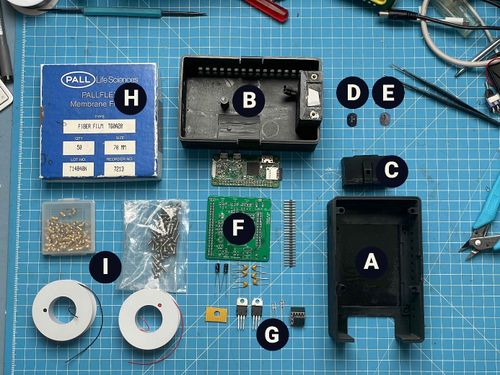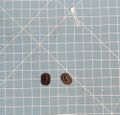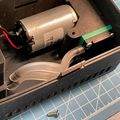Difference between revisions of "Assembly"
| Line 13: | Line 13: | ||
== Component locations 5V bcMeter PCB == | == Component locations 5V bcMeter PCB == | ||
<vimeo>684373327</vimeo> Introduction to bcMeter 5V | |||
{| class="wikitable collapsible collapsed sortable" | {| class="wikitable collapsible collapsed sortable" | ||
Revision as of 19:43, 10 May 2022
Overview of parts
Requirements:
- Screwdriver
- Solder Iron
- Solder
- Flux
- 3D Printer / 3d printing service
- bcMeter Parts
Component locations 5V bcMeter PCB
Introduction to bcMeter 5V
Component locations 12V general purpose PCB (big)
(We recommend to use the 5V pcb - the big PCB is easier to assemble at the cost of accuracy)
| Ref | Value | Part | Footprint | Description | Vendor |
|---|---|---|---|---|---|
| C1 | 330nF | Device:CP | Capacitor_THT:CP_Radial_D5.0mm_P2.50mm | Polarized capacitor | |
| C2 | 100nF | Device:C | Capacitor_THT:C_Disc_D5.0mm_W2.5mm_P2.50mm | Unpolarized capacitor | |
| C3 | 330nF | Device:CP | Capacitor_THT:CP_Radial_D5.0mm_P2.50mm | Polarized capacitor | |
| C4 | 100nF | Device:C | Capacitor_THT:C_Disc_D5.0mm_W2.5mm_P2.50mm | Unpolarized capacitor | |
| C5 | 10nF | Device:C | Capacitor_THT:C_Disc_D5.0mm_W2.5mm_P2.50mm | Unpolarized capacitor | |
| C6 | 1nF | Device:C | Capacitor_THT:C_Disc_D5.0mm_W2.5mm_P2.50mm | Unpolarized capacitor | |
| C7 | 10uF | Device:CP | Capacitor_THT:C_Disc_D5.0mm_W2.5mm_P2.50mm | Polarized capacitor | |
| C8 | 100nF | Device:C | Capacitor_THT:C_Disc_D5.0mm_W2.5mm_P2.50mm | Unpolarized capacitor | |
| C9 | 10nF | Device:C | Capacitor_THT:C_Disc_D5.0mm_W2.5mm_P2.50mm | Unpolarized capacitor | |
| C10 | 1nF | Device:C | Capacitor_THT:C_Disc_D5.0mm_W2.5mm_P2.50mm | Unpolarized capacitor | |
| C11 | 10nF | Device:C | Capacitor_THT:C_Disc_D5.0mm_W2.5mm_P2.50mm | Unpolarized capacitor | |
| C12 | 1nF | Device:C | Capacitor_THT:C_Disc_D5.0mm_W2.5mm_P2.50mm | Unpolarized capacitor | |
| D1 | IRL81A | Device:LED | LED_THT:LED_SideEmitter_Rectangular_W4.5mm_H1.6mm | Light emitting diode | |
| D2 | IRL81A | Device:LED | LED_THT:LED_SideEmitter_Rectangular_W4.5mm_H1.6mm | Light emitting diode | |
| J1 | Jack-DC | Connector:Jack-DC | Connector_BarrelJack:BarrelJack_Wuerth_6941xx301002 | DC Barrel Jack | |
| J2 | Raspberry_Pi_2_3 | Connector:Raspberry_Pi_2_3 | Connector_PinSocket_2.54mm:PinSocket_2x20_P2.54mm_Vertical | expansion header for Raspberry Pi 2 & 3 | |
| J3 | Conn_02x13_Odd_Even | Connector_Generic:Conn_02x13_Odd_Even | Connector_PinHeader_2.54mm:PinHeader_2x13_P2.54mm_Vertical | Generic connector, double row, 02x13, odd/even pin numbering scheme (row 1 odd numbers, row 2 even numbers), script generated (kicad-library-utils/schlib/autogen/connector/) | |
| J4 | RTC | Connector_Generic:Conn_01x05 | Connector_PinHeader_2.54mm:PinHeader_1x05_P2.54mm_Vertical | Generic connector, single row, 01x05, script generated (kicad-library-utils/schlib/autogen/connector/) | |
| J5 | TMP | Connector_Generic:Conn_01x04 | Connector_PinHeader_2.54mm:PinHeader_1x04_P2.54mm_Vertical | Generic connector, single row, 01x04, script generated (kicad-library-utils/schlib/autogen/connector/) | |
| M1 | 12V Pump | Motor:Fan_CPU_4pin | Connector_PinHeader_2.54mm:PinHeader_1x04_P2.54mm_Vertical | CPU Fan, tacho output, PWM input, 4-pin connector | |
| M2 | AirflowMeter | Motor:Fan_Tacho_PWM | Connector_PinHeader_2.54mm:PinHeader_1x03_P2.54mm_Vertical | Fan, tacho output, PWM input, 4-pin connector | |
| Q1 | LPT80A | Sensor_Optical:LPT80A | OptoDevice:Osram_LPT80A | NPN phototransistor | |
| Q2 | MMBT3904 | Transistor_BJT:MMBT3904 | Package_TO_SOT_SMD:SOT-23 | 0.2A Ic, 40V Vce, Small Signal NPN Transistor, SOT-23 | |
| Q3 | LPT80A | Sensor_Optical:LPT80A | OptoDevice:Osram_LPT80A | NPN phototransistor | |
| R1 | 2k2 | Device:R | Resistor_THT:R_Axial_DIN0207_L6.3mm_D2.5mm_P7.62mm_Horizontal | Resistor | |
| R2 | 100 | Device:R | Resistor_THT:R_Axial_DIN0207_L6.3mm_D2.5mm_P7.62mm_Horizontal | Resistor | |
| R3 | 2k2 | Device:R | Resistor_THT:R_Axial_DIN0207_L6.3mm_D2.5mm_P7.62mm_Horizontal | Resistor | |
| R4 | 10k | Device:R | Resistor_THT:R_Axial_DIN0207_L6.3mm_D2.5mm_P7.62mm_Horizontal | Resistor | |
| RV1 | R_POT | Device:R_POT | Connector_PinHeader_2.54mm:PinHeader_1x03_P2.54mm_Vertical | Potentiometer | |
| SW1 | Interrupt | Switch:SW_Push_Open | Connector_PinHeader_2.54mm:PinHeader_2x01_P2.54mm_Vertical | Push button switch, push-to-open, generic, two pins | |
| U1 | L7809 | Regulator_Linear:L7809 | Connector_PinHeader_2.54mm:PinHeader_1x03_P2.54mm_Vertical | Positive 1.5A 35V Linear Regulator, Fixed Output 9V, TO-220/TO-263/TO-252 | |
| U2 | L7805 | Regulator_Linear:L7805 | Connector_PinHeader_2.54mm:PinHeader_1x03_P2.54mm_Vertical | Positive 1.5A 35V Linear Regulator, Fixed Output 5V, TO-220/TO-263/TO-252 | |
| U3 | MCP3426-xMS | Analog_ADC:MCP3426-xMS | Package_SO:MSOP-8_3x3mm_P0.65mm | 16-Bit, Multi-Channel ΔΣ Analog-to-Digital Converter with I2C Interface and On-Board Reference, MSOP-8 |
Walkthrough 12V general purpose PCB
Time lapse of assembly
This guide is for the general purpose 12V PCB which was designed for simplicity so as little as possible SMD components and parts with large footprints are used.
1. Start assembling by soldering the smallest parts first (MMBT3904 + MCP3426).
2. Then add THT passive parts piece by piece, the Pi Header (or connector) according to description on the PCB and the BOM.
3. Put IRL81A (IR Emitter) and LPT80A (Sensor) in brackets D and E - refer to overview above - seal with hot glue and solder wires to the corresponding vias on the PCB. Long leg is anode (positive).
4. Place adapters D and E (refer to overview above) in the case A and B. Emitter to top case. Seal with (hot) glue or tape.
5. Put pump in place and do a test run for leakage.
6. Secure the raspberry with 3d printed brackts
7. Put the rubber band (cut down to two peaces or use one) to prevent air leaks onto lower case, also add screw threads if you want to.
8. Put filter paper on top of the rubber, screw the intake part on top and continue with software configuration.






















